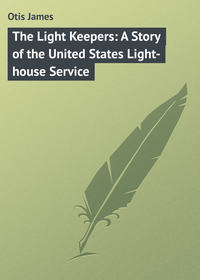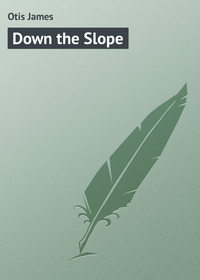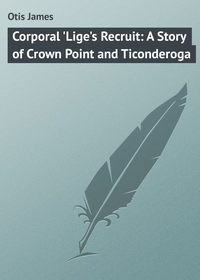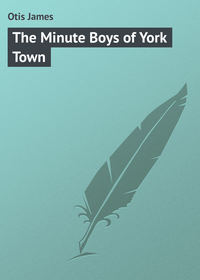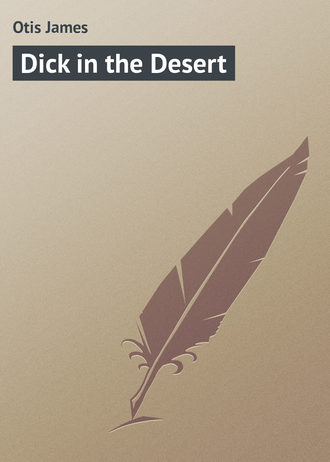 полная версия
полная версияDick in the Desert
The wounded man seized the tin vessel eagerly, and it required all Dick's strength to prevent him from draining it at once.
"I'm afraid to give you more now, my poor old man; but wait, like a dear, and I'll let you take it again when you're on the horse."
Not until after a violent struggle, which frightened Dick because it seemed almost as if he was raising his hand against his father, did he regain possession of the canteen, and then a full half of the contents had been consumed.
When his thirst was in a measure quenched, Mr. Stevens lay quietly on the sand, save now and then as he moaned in unconscious agony, heeding not the boy's pleading words.
"Try to help yourself a bit, daddy," he urged. "If you'll stand on one foot I can manage to lift you onto the horse's back."
Again and again did Dick try by words to persuade his father to do as he desired, and then he realized how useless were his efforts.
He had heard of this delirium which often follows neglect of gun-shot wounds, but had no idea how he should set about checking it.
After understanding that words were useless, and knowing full well he could not lift unaided such a weight onto the horse's back, he crouched by his father's side in helpless grief.
Never before had he known what it was to be afraid, however far he might be from others of his kind; but now, as he listened to the meaningless words, or the piteous moans, terror took possession of him, and the soft sighing of the gentle wind sounded in his ears like a menace.
The horse strayed here and there seeking food, but he gave no heed.
Such garments as his mother had given him, Dick spread over the sufferer; and that done there was nothing for him save to wait.
It seemed to the anxious boy as if the night would never end. Now and then he rose to his feet, scanning the eastern sky in the hope of seeing some signs of coming dawn; but the light of the stars had not faded, and he knew the morning was yet far away.
Finally, when it seemed to him as if he could no longer remain idle listening to a strong man's childish prattle, the eastern heavens were lighted by a dull glow, which increased steadily until he could see the horse feeding on the dry bunch-grass an hundred yards away, and his long vigil was nearly at an end.
His father called for water from time to time, and Dick had given him to drink from the canteen till no more than a cupful remained.
Now he asked again, but in a voice which sounded more familiar; and a great hope sprang up in the boy's heart as he said, —
"There's only a little left, you poor old man, and we can't get more this side the camp. Shall I give it to you now?"
"Let me moisten my lips, Dick dear. They are parched, and my tongue is swollen until it seems ready to burst."
Dick handed him the canteen; and his father drank sparingly, in marked contrast to his greedy swallowing of a few moments previous.
"It tastes sweet, my boy; and when we are at the camp I'll need only to look at the brook in order to get relief. Are you soon going for the horse?"
"I went, an' have got back, daddy dear. You've been talking mighty queer – on account of the wound, I suppose."
"How long have you been with me, child?"
"I must have got here before midnight, and the morning is just coming now."
"You're a good boy, Dick."
"That's what mother said before I left, and between the two of you I'm afraid you'll make me out way beyond what I deserve. We must get back as soon as we can, you poor old man; for she'll be crying her eyes sore with thinking we've both knocked under. Will we have a try at getting on horseback?"
"Yes; and I reckon it can be done. Lead the beast up here, and then help me on my feet – I've grown as weak as a baby, Dick."
"And I don't wonder at it. According to the looks of this sage-brush you must have lost half of all the blood you had at this time yesterday."
Now that his father was conscious once more, all Dick's reasonless terror fled, and again he was the manly fellow he had always shown himself to be.
The horse was led to Mr. Stevens's side; and Dick raised the nearly powerless body until, at the expense of most severe pain, but without sign of it by even so much as a groan, his father stood on the uninjured limb.
Fortunately the horse was too weary to make much protest at what followed; with a restive steed it would have been impossible for the boy to half lift, half push his father up until he was seated on the bag that served as saddle.
"How is it now, you poor old man? Can you hold on there a couple of hours?"
"I must, my boy; and if it so be I show signs of losing my reason again, you must contrive to lash me here, for unless this wound is attended to in better shape than it is just now, I'll go under."
"For mother's sake you must keep a good grip on yourself. It'll come tough, I know; but once we're in camp you shall live on the fat of the land."
Dick took up his father's rifle, – his own he had left in the wagon when he went after the horse, – and, leading the animal by the bridle, marched on, glancing back every few seconds to learn how the rider was faring.
Although he struggled to repress any evidence of pain, Mr. Stevens could not prevent the agony from being apparent on his face; and Dick, who had neither eaten nor slept during the past twenty-four hours, did all a boy could have done to cheer the sufferer, without thought of his own necessities.
"We'll soon be in camp, daddy, when you're to have everything you need," he said from time to time; and then, fancying this was not sufficient encouragement, he finally added, "you know I'm going over to Antelope Spring to get some doctor's stuff as soon as I've found game enough to keep the camp supplied while I'm away."
"Antelope Spring!" Mr. Stevens cried, aroused from his suffering for an instant by the bold assertion. "You shall never do it, Dick, not if I had twenty wounds! It's as much as a man's life is worth to cross the desert on foot, and these horses of ours are worse than none at all."
"By the time we've been in camp a couple of weeks where the feed is good, they'll pick up in great shape, and be fit to haul the old wagon home. Won't it be prime to see the town once more? And there'll be no more hunting 'round for a place where we can get a livin' easy, eh, daddy?"
"No, Dickey; once we're there we'll stay, and I'm going to turn over a new leaf if my life is spared. I'll do more work and less loafing. But you're not to cross the desert alone, my boy."
"It may be travellers will come our way, an' I can go with them," Dick replied, taking good care not to make any promises; for he understood from what his mother had said that it would be absolutely necessary that aid should be had from the nearest settlement.
Fortunately, as it then seemed to the boy, the pain which his father was enduring prevented him from dwelling upon the subject; and as Dick trudged on, trying to force the horse into a more rapid gait, he turned over in his mind all he had heard regarding such a journey.
There were many times when it seemed certain Mr. Stevens must succumb to the suffering caused by the wound; but he contrived to "keep a good grip" on himself, as Dick had suggested, and after what seemed the longest and most painful journey the boy had ever experienced, the two came upon landmarks which told they were nearing the encampment.
His father was ghastly pale. The big drops of sweat on his forehead told of intense pain; and, in order to revive his courage yet a little longer, Dick shouted loudly to warn the dear ones who were waiting.
"They'll soon come running to meet us; and you must put on a bold front, daddy, else mother will think you're near dead. Hold hard a little while longer, and then we'll have you in the wagon, where all hands of us can doctor you in great shape."
It is more than probable that, had he been alone, with no one to cheer him, Mr. Stevens might never have been able to endure the agony which must have been his. Thanks to Dick's cheering words, however, he not only kept his seat, but remained conscious until his wife and son lifted him from the horse to the bed hastily prepared in the vehicle.
Then nature asserted herself; and he speedily sank into unconsciousness accompanied by delirium, as when Dick had watched by his side.
"He was just that way all night, and it frightened me, mother. What can we do for him?"
"I don't know, Dick dear; indeed I don't. Unless he can have proper attention death must soon come, and I am ignorant of such nursing as he needs. If we were only where we could call in a doctor!"
"Wouldn't it do almost as well if we had medicine for him?"
"Perhaps so; but if we could get such things it would also be possible to at least find out what we should do."
"The horses wouldn't pull us across the desert until after they've rested a spell," Dick said half to himself.
"And even if they could, we must have food."
"See here, mother; you fix up daddy's leg the best you know how, and I'll look around for something that'll fill the pot. There are rabbits here in plenty, though it's mighty hard luck when you have to waste a cartridge on each one. I'll have enough in the way of meat by the time you've washed the wound. I've heard the poor old man himself say that plenty of cool water was needed on a bullet-hole."
Mrs. Stevens could not be hopeful under the circumstances, for she knew better than did Dick how slight was the chance that the injured man could live where it was impossible to care properly for the wound; but she would not deprive the boy of hope, and turned to do as he suggested.
Although weary and footsore, Dick did not spend many moments in camp.
He waited only long enough to get his rifle and ammunition, and then trudged off; for meat must be had, even at the expense of cartridges, both for the wounded man and the remainder of the family.
An hour later Dick returned with two rabbits; and when these had been made ready for cooking, he clambered into the wagon to see his father.
The invalid looked more comfortable, even though nothing had been done for his relief save to cleanse the wound, and dress it in such fashion as was possible; but he was still in the delirium, and after kissing the pale forehead, Dick went to where his mother was making ready for the long-delayed meal.
"I don't reckon there's a bit of anything to eat, mother?"
"I shall soon have these rabbits cooked."
"But I must be off after larger game, and don't want to wait till dinner is ready."
"You need the food, Dickey, and there is only a tiny bit of bread."
"Give me that, mother dear. It will stop the hole in my stomach for a spell, and when I come back there'll be plenty of time to eat meat."
Had the circumstances been one whit less grave, Mrs. Stevens would not have consented to his setting out before having eaten a hearty meal; but she knew that more meat would soon be needed, since they had no other food, and two rabbits would hardly provide the famishing ones with enough to stay their hunger for the time being.
The piece of bread, baked the day previous from the last of their store of flour, was brought out; and, munching it slowly that it might seem to be more, Dick started off again.
Not until nearly nightfall did he return; but he had with him such portion of a deer's carcass as he could drag, and all fear of starvation was banished from camp.
The wounded man was resting more comfortably, if such term can be applied properly when one is suffering severest pain; and after hanging the meat beneath the wagon, Dick questioned his mother as to what might be done if they were within reach of a physician.
"If we could see one, Dickey, your father's life might be saved, for such a wound should not be exceedingly dangerous. If I knew how to treat it, and had the proper washes, we ought to nurse him back to life; but as it is, I haven't even that which would check the fever."
"If you could talk to a doctor would it be all right?"
"I believe so, Dickey."
"Would the medecine you want cost very much?"
"It is the same to us whether the price be much or little, since we haven't the opportunity to get what is needed, nor the money with which to pay for it if a shop were near at hand."
Dick ceased his questioning, and set about performing such work around the camp as might well have been left undone until the next day.
A generous supply of broiled venison was made ready, and the boy ate heartily; after which he went into the wagon, telling his mother he would play the part of nurse until dark, when she could take his place.
Once in the vehicle, partially screened from view, Dick, after much search for the bit of a lead-pencil his father owned, wrote on a piece of brown paper that had contained the last ten pounds of flour Mr. Stevens had purchased, the following words, —
Dear Mother, – I know you won't let me go to Antelope Spring if I tell you about what I'm minded to do, so I shall slip off the first thing in the morning. I'll take my rifle with me, and by selling it, get what stuff daddy needs. I can talk with a doctor too; and when I come back we'll fix the poor old man up in great shape.
Don't worry about me, for I can get across without any bother. I'm going to take the canteen and some slices of meat, so I sha'n't be hungry or thirsty. I count on being back in three days; but if I'm gone five you mustn't think anything has gone wrong, for it may be a longer trip than I'm reckonin' on.
I love you, and daddy, and Margie mighty well; and this footing it across the desert ain't half as dangerous as you think for.
Your son,Dickey.When this had been done, he kissed his father twice, smoothed the hair back from the pale, damp forehead, and whispered, —
"I'm going so's you'll get well, my poor old man; and you mustn't make any kick, 'cause it's got to be done."
Then he came out as if tired of playing the nurse, and proposed that he sleep under the wagon that night.
"With all hands inside, daddy would be crowded; and I'm as well off out-of-doors. Kiss me, mother, for I'm mighty tired."
CHAPTER III.
A SAND-STORM
In this proposal to retire thus early Mrs. Stevens saw nothing to excite her suspicions regarding Dick's real intentions.
He had worked for thirty-six hours almost incessantly; and it would not be strange if this unusual exertion, together with the weariness caused by excitement, had brought him to the verge of exhaustion.
His mother would have insisted upon bringing out one of the well-worn blankets, but that Dick was decidedly opposed to taking anything from the wagon which might in the slightest degree contribute to his father's comfort.
"I'm very well off on the bare ground, and with the wagon to shelter me from the dew I couldn't be better fixed. Our poor old man needs all we've got, mother; and you may be sure I won't lay awake thinking of the feather-beds we had at Willow Point, 'cause it's about as much as I can do to keep my eyes open."
"You are a dear good boy, and God will reward you. In addition to saving your father's life, for that is what you've done this day, you have lightened my burden until it would be wicked to repine."
"I'll risk your ever doing anything very wicked, mother; and if the time comes when it seems to you as though I don't do exactly as you want me to, just remember all you've said about my being a good boy, an' let it be a stand-off, will you?"
"I am certain you will never do anything to cause me sorrow, Dickey, dear. Don't get up until you have been thoroughly rested; for now that we have food in camp, I can do all that will be necessary."
Then Dick's mother kissed him again, not leaving him until he had stretched out at full length under the wagon; and so tired was the boy that Mrs. Stevens had hardly got back to take up her duties as nurse when his loud breathing told that he was asleep.
When Dick awakened it was still dark; but he believed, because he no longer felt extremely weary, that the night was nearly spent; and for the success of his plan it was of the utmost importance he should set out before his mother was astir.
It was his purpose to travel on foot to Antelope Spring, a distance in an air-line of about forty-five miles, fifteen of which would be across the upper portion of Smoke Creek Desert.
In this waste of sand lay all the danger of the undertaking. The number of miles to be travelled troubled him but little, for more than once had he walked nearly as far in a single day while hunting; and he proposed to spend thirty-six hours on each stage of the journey.
Creeping cautiously out from under the wagon, he fastened his letter to the flap of the canvas covering in such a manner that his mother could not fail to see it when she first came out; and then he wrapped in leaves several slices of broiled venison, after which he stowed them in his pocket.
The canteen was filled at a spring near-by.
He saw to it that his ammunition belt contained no more than half a dozen cartridges, and then took up his rifle, handling it almost lovingly; for this, his only valuable possession, he intended to part with in order to secure what might be necessary for his father's relief and comfort.
The weapon was slung over his back where it would not impede his movements; and with a single glance backward he set out with a long, swinging stride such as he knew by experience he could maintain for many hours.
It was still dark when he had crossed the fertile meadows, and arrived at the border of an apparently limitless expanse of yellow sand.
Here it would not be possible to maintain the pace at which he had started, because of the loose sand in which his feet sank to the depth of an inch at each step.
Having set out at such an early hour, this boy, who was perilling his life in the hope of aiding his father, believed the more dangerous portion of the journey might be accomplished before the heat of the day should be the most severe.
When the sun rose Dick had travelled, as nearly as he could estimate, over three miles of desert; and his courage increased with the knowledge that one-fifth of the distance across the sands had already been traversed.
At the end of the next hour he said to himself that he must be nearly midway on the road of sand; and although the labor of walking was most severe, his heart was very light.
"Once across, I'll push on as fast as any fellow can walk," he said aloud, as if the sound of his own voice gave him cheer. "By making an extra effort I ought to be in Antelope Spring before midnight, and have plenty of time to sleep between now and morning. Half a day there to sell the rifle, an' buy what is needed, an' by sunset I should be at the edge of the desert again, ready to make this part of the tramp after dark."
He walked quickly, and like one who intends to go but a short distance.
The forty-five-mile tramp seemed to him but a trifle as compared with what was to be gained by the making of it.
He thought of his mother as she read the note he had left on the flap of the wagon-covering, and wondered if she looked upon his departure as an act of disobedience, which, in fact, it was, since both his parents had insisted he should not attempt it.
Then his thoughts went out to his father, and he told over in his mind all the questions he would ask of the doctor at Antelope Spring; for he had no doubt but that he should find one of that profession there.
He took little heed to the monotonous view around him, until suddenly he saw in the distance what appeared to be a low-hanging cloud; then he said to himself that if a shower should spring up the sun's face would be covered, and the heat, which was now very great, must be lessened.
As this cloud advanced, descending to the sands while it rose toward the heavens, it grew more black; and on either side were long columns of seeming vapor rising, and as rapidly disappearing.
Then across the darkness on that portion of the horizon something bright moved swiftly, as if a flash of lightning had passed over the face of the cloud; and in an instant the sun and the sky were shut out from view.
Now the clouds took on the appearance of a dense black fog, coming up from the southward over the desert, until Dick was seemingly looking at a gigantic wall, over the face of which shone now and then bright flashes of light.
There was a shrieking and moaning in the air, so it seemed to the startled boy; and he failed to understand the meaning of this strange scene, until, the impenetrable wall having come so near, he could see that what appeared like flashes of light were gigantic columns of sand springing high in the air with fantastic shapes, and glinted by the sun from above the apparent vapor, until they were swallowed up in the enormous bank of cloud behind them.
Then it was Dick knew the meaning of this terrible danger which threatened him.
It was a storm of sand. "Dancing giants" some have termed it, and others speak of it as the "hot blizzard."
As if in an instant the dancing, swirling columns and the rushing cloud of sand, which swayed to and fro in fantastic movements, surrounded him.
He was in the centre of a cyclone freighted with particles of sand.
The wind roared until one might have believed he heard the crash of thunder.
Dick halted, terrified, bewildered; and as he came to a standstill, it seemed to him that the clouds on every hand lowered until he could see the blue sky above. Then with a shriek from the wind the very sand beneath his feet rose and fell like billows of the sea.
The tempest was upon him.
He shielded his eyes with his arm; but the stinging, heated particles sought out every inch of his body, and his clothing afforded but little protection.
The sand penetrated his ears and nostrils, and burned his lips until they bled.
He had heard it said that to remain motionless in such a tempest means death; for wherever the wind meets with an obstruction, there it piles the sand in huge mounds, and his father had told of more than one hunter who had thus been buried alive.
It was death to remain motionless, and yet to move seemed impossible.
Whether he turned to the right or the left the whirlwind struck him with a fury which it was difficult to withstand. It was as if the wind swept in upon him from every point of the compass – as if he was the centre of this whirling, dancing, blinding, murderous onrush of sand.
The boy's throat was dry. He was burning with thirst.
The dust-laden air seemed to have literally filled his lungs, and it was with difficulty he could breathe.
Despite the protection he sought to give, his eyes were inflamed, and the lids cruelly swollen.
He sank ankle-deep at every step, and above him and around him the wild blasts shrieked, until there were times when he feared lest he should be thrown from his feet.
Pulling his hat down over his aching eyes, the bewildered, terrified boy tried to gain some relief from the thirst which assailed him.
He understood that the contents of his canteen must be guarded jealously; for if he lived there were still several miles of the desert journey to be traversed, and the walking would be even more difficult than before the storm set in, because of the shifting sand.
His distress rendered him reckless; and regardless of the future, he drank fully half the water in the canteen, bathing his eyes with a small quantity poured in the hollow of his hand.
It would have been better if he had not tried to find relief by this last method, for the flying particles of sand adhered to such portions of his face as were wet, forming a coating over the skin almost instantly.
He attempted to brush it off, and the gritty substance cut into his flesh as if he had rubbed it with emery-paper.
Then came into Dick's mind the thought that he should never more see his parents on this earth, and for the instant his courage so far deserted him that he was on the point of flinging himself face downward upon the sand.
Fortunately there appeared before his mental vision a picture of his father lying in the wagon with the certainty that death would come unless his son could bring relief, and this nerved the boy to yet greater exertion.
With his arms over his face, he pushed forward once more, not knowing whether he might be retracing his steps, or proceeding in the proper direction.


